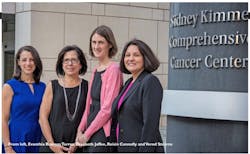A novel three-drug combination achieved notable responses in patients with advanced HER2-negative breast cancer, according to new research directed by investigators from the Johns Hopkins Kimmel Cancer Center.
The treatment included a histone deacetylase (HDAC) inhibitor — a drug that causes a chemical change to stop tumor cells from dividing — with two types of immunotherapy known as checkpoint inhibitors, which unharness the power of the immune response against cancer.
The multicenter phase IB study, which aimed to improve response to checkpoint inhibitors by sensitizing the tumor microenvironment, found that the combination therapy resulted in a 25% overall response rate (ORR) in women with advanced HER2 (human epidermal growth factor receptor 2)-negative breast cancer. This means that for 25% of women who received the therapy, their cancer was destroyed or significantly reduced. Patients with triple-negative breast cancer, who have fewer treatment options than patients with other breast cancers, had an ORR of 40%. These results were published in Nature Cancer on Feb. 14.
This study, sponsored by the National Cancer Institute, was conducted across four clinical sites and included 24 women with HER2-negative metastatic breast cancer. Twelve had hormone receptor-positive disease, and 12 had triple negative disease. All received entinostat plus two types of immunotherapy: the PD-1/PD-L1 inhibitor nivolumab and the CTLA-4 inhibitor ipilimumab.
The study met its primary endpoint of safety by demonstrating that there were expected and tolerable toxicities among patients, with none requiring discontinuation of therapy. The average progression-free survival (PFS) was 50% at six months, meaning for half of the participants, their disease did not worsen for at least six months. Future studies will address the treatment’s efficacy.

